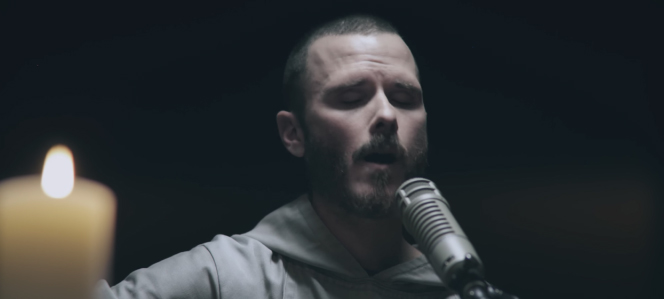“Somos peregrinos—caminamos al Senor. Poco a poco, vamos a llegar.”
A member of the Franciscan Friars of the Renewal had taught himself this line while struggling to learn Spanish in Honduras. We are pilgrims—we walk to the Lord, it says. Little by little, we will arrive.
When Brother Isaiah heard those words—especially that unforgettable phrase, “poco a poco”—they grabbed his heart and spoke to him. But they also came to represent something universal about the human journey back to God—a spirituality that is not about getting there all at once, but about putting one foot in front of the other, doing little acts with great love, slowly but surely finding our way back home. “It’s true, and it crosses cultural boundaries, and age boundaries, and so many other things,” he explains in one video. “It’s like this chorus of the human heart.”
In his brand new album, Poco a Poco, Brother Isaiah offers a bouquet of different aspects of this insight, the songs gathered up with the same breezy, soulful charm of earlier tracks like “Receive Me (I’m Yours)” and “Jacob’s Song.”
But one song on the album instantly caught my attention—not only for its loveliness but for its timeliness. In any other year, “Love Song for the Bride” would’ve been just as beautiful; but in 2018, it’s also an anthem of sorts, one that offers a balm to a wounded Catholic Church suffering through great scandal and uncertainty.
The song opens with a plaintive call and a beautiful, almost otherworldly background vocalization interwoven with the rest of the lyrics:
Holy Mount Zion
Bride of the Most High God
See, behold your beauty, yeah
Radiant in the gaze of your lover king
Zion you’re a princess, you’re a Bride
But you don’t seem to see it on the inside
I see you running after so many lovers yeah
Just to find yourself alone and uncovered yeah
Beat down, strung out, so unsatisfied
With all the masks you wear, and all the tricks you’ve tried
I see you running, see you stumbling, see you falling down
I see you longing, see you dying just to be found …
Lift up your eyes, gorgeous bride of the most high!
Your king is here and he’s living on the inside
Knock, knock, knocking on your broken heart’s door so tenderly
They call him lover of the poor
So turn your gaze to the mystery
The one alone who heals your history
Behold he makes all things new
Just looking at you…
Behold the Bridegroom is here
Behold the Bridegroom is here
Zion, oh Zion, oh Zion, oh Zion
Come out to meet him!
The lyrics, Brother Isaiah explains, hearken back to those fundamentals of the human heart. “We so easily forget there is only One who can bring us the peace we’re constantly looking for in everything. We can get so frenetic running around, trying to find something that can quiet the heart and mind in our day to day but often times, we just find ourselves more restless than when we started. We run after ‘so many lovers’ in this way each day.”
But in the Spanish refrain that inspired the album, authentic spirituality also takes on a strikingly collective nature: We are pilgrims; we walk; and little by little, we will arrive. “Love Song for the Bride” also looks to this deeply Catholic idea, which stretches back to the writings of Paul: that the Church is not a collection of buildings or leaders, not a philosophy or an ideology, and not even a kind of club. Instead, it is a Body, a kind of organism that is bound together through the sacraments, and through those same sacraments, bound together with Christ.
This unity of Christ with his Body implies a distinction and a particular kind of relationship, one often expressed in the image of a bridegroom to his bride. The Catechism puts it this way: “The theme of Christ as Bridegroom of the Church was prepared for by the prophets and announced by John the Baptist. The Lord referred to himself as the ‘bridegroom…’ The Church is the spotless bride of the spotless Lamb. ‘Christ loved the Church and gave himself up for her, that he might sanctify her’” (CCC 796). This image of God as king and lover, and of the Church as his beloved queen, is the essence of Brother Isaiah’s song.
“The song is for the Church,” he explains. “I wanted to remind her about the One who loves her. She can get pretty distracted, lost on ‘secondary things,’ losing sight of the One who alone gives her meaning. We forget ‘whose’ we are and so we act out of our insecurities and wounds rather than out of the humble security that the tender gaze of Christ gives us. The funny thing is, it’s in the very moment of confessing how distracted we’ve become, how much we’ve forgotten the ‘one thing necessary’ that we find him—‘the one alone who heals our history’—right before us, waiting to touch us, to heal us, and remind us whose we are.”
For a Church that finds itself in very dark and choppy waters, “Love Song for the Bride” offers a respite of great light and strength, one that looks to the security of God’s promise. In the book of Hebrews, we read: “You have approached Mount Zion and the city of the living God, the heavenly Jerusalem” (Heb 12:22). And in Revelation: “I also saw the holy city, a new Jerusalem, coming down out of heaven from God, prepared as a bride adorned for her husband” (Rev 21:2). As the Church and her members navigate the vicissitudes of this earthly pilgrimage, our heavenly summons—and in that summons, our deepest identity and surest peace—remains the same: Repent, and believe in the Gospel. The Bridegroom is here.
